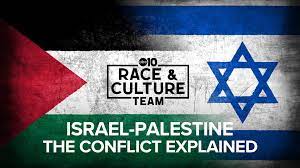
The Palestine-Israel Conflict and Its Implications
Title: India's Delicate Balancing Act: The Palestine-Israel Conflict and Its Implications
In recent times, the Middle East has once again become a hotspot for conflict, with the terrorist organization Hamas launching attacks on Israel and Israel responding with force in the Gaza Strip. This ongoing crisis has claimed the lives of more than 1,200 people, with over 700 casualties in the West Bank and Gaza Strip alone. The world stands divided, with powerful nations such as the United States, the United Kingdom, France, and Italy openly supporting Israel, while Arab countries rally behind Hamas. In this complex geopolitical landscape, India's stance on the Israel-Palestine conflict is noteworthy and plays a crucial role in its foreign policy.
India-Palestine Relations: A Historical Perspective
Palestine, located in West Asia, comprises two regions: the West Bank along the Mediterranean coast and the Gaza Strip in the east. Jerusalem, a city of immense religious significance for Christianity, Judaism, and Islam, is at the heart of the Israeli-Palestinian conflict.
India's position in the Israel-Palestine dispute has been consistent and comprehensive. Supporting Palestine has been a cornerstone of India's foreign policy, and this stance dates back to pre-independence days. Mahatma Gandhi famously equated Palestine to England for the English or France for the French in 1938. Jawaharlal Nehru also likened the Palestine issue to the communal problems of the Indian subcontinent.
From the outset, India has advocated for peaceful resolutions to the Palestinian issue. Congress governments have consistently supported the Palestinian cause. In 1974, Palestine became the first non-Arab country to recognize the Palestine Liberation Organization (PLO) and its leader, Yasser Arafat. In 1988, India recognized Palestine as a nation, emphasizing its opposition to the division of countries along religious lines to maintain strong diplomatic ties with Arab nations.
Diplomacy of India: The Balancing Act
India's support for Palestine has been a strategic move, considering the importance of maintaining friendly relations with Arab and Gulf countries. India imports oil from Arab nations, and these countries have played a significant role in supporting India during the COVID-19 pandemic by supplying essential commodities.
Moreover, millions of Indians work in Gulf countries, which adds economic and diplomatic importance to the relationship. Simultaneously, India has never endorsed Israel's strategy of territorial occupation in the West Bank and Gaza Strip.
India's "Look West" foreign policy, launched to garner the support of West Asian countries, has further cemented these relationships. In 2018, Prime Minister Narendra Modi made history by becoming the first Indian Prime Minister to visit Palestine and was awarded Palestine's highest honor, the Collar of the State of Palestine.
India-Israel Relations: A Growing Partnership
On the other side of the coin, India's relationship with Israel has witnessed significant growth. Israel, a Jewish state in West Asia, was recognized by India in 1950, and full diplomatic relations were established in 1992. The economic ties have strengthened as trade has expanded from $5 billion before the COVID-19 pandemic to approximately $7.5 billion by January 2023. Diamonds account for approximately 50% of this bilateral trade, and India is Israel's third-largest trading partner in Asia.
India is the largest recipient of arms from Israel, and the defense partnership is a vital component of their relationship. Both countries share objectives in renewable energy and clean energy, with Israel joining India's International Solar Alliance (ISA). Negotiations for a Free Trade Agreement (FTA) between the two nations are also ongoing.
India's Approach Towards China-Pakistan
In the Israel-Hamas conflict, India's diplomatic approach is marked by a delicate balancing act. Openly supporting Israel could weaken India's international standing and potentially give Pakistan and China a pretext to lay claims to territories in Kashmir. India has avoided making such open declarations. Pakistan and China support Palestine and Hamas, with Pakistan openly backing the latter and China opposing Israeli construction activities in the West Bank and Jerusalem.
Saudi Arabia, in a state of dilemma, leans against violence, and the U.S. has mediated to normalize Israel-Saudi relations. The situation is complex, but India's approach is driven by the need to maintain diplomatic and economic relationships with both Palestine and Israel.
Conclusion
India's stance on the Israel-Palestine conflict is a careful diplomatic maneuver, driven by its strategic interests. While India benefits from its close ties with Arab nations and the support they provide in various international matters, its growing partnership with Israel also plays a pivotal role in trade, defense, and clean energy initiatives. In this complex geopolitical landscape, India's balancing act showcases its ability to navigate international relations for the greater good of its nation and its people.